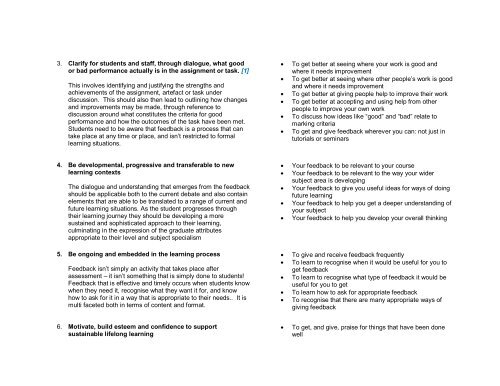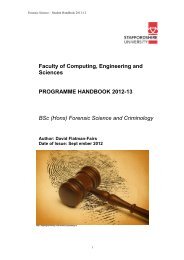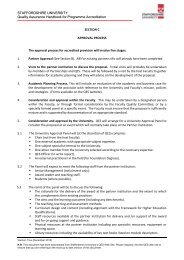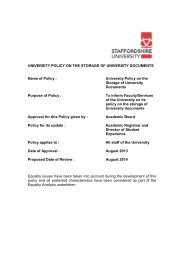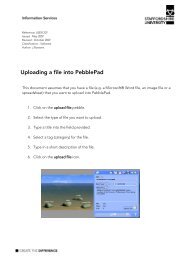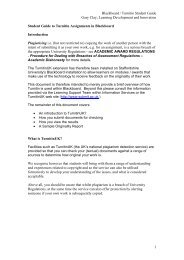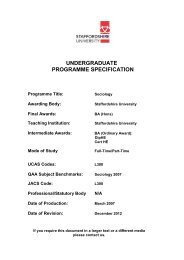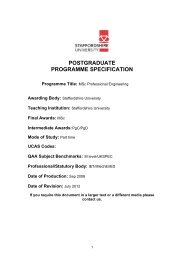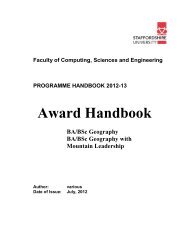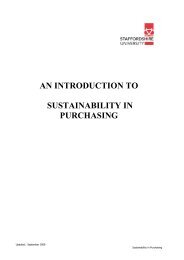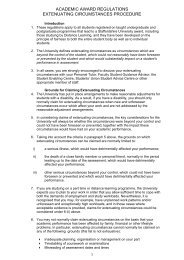BSc HONS BIOMEDICAL SCIENCE - Staffordshire University
BSc HONS BIOMEDICAL SCIENCE - Staffordshire University
BSc HONS BIOMEDICAL SCIENCE - Staffordshire University
Create successful ePaper yourself
Turn your PDF publications into a flip-book with our unique Google optimized e-Paper software.
3. Clarify for students and staff, through dialogue, what good<br />
or bad performance actually is in the assignment or task. [1]<br />
This involves identifying and justifying the strengths and<br />
achievements of the assignment, artefact or task under<br />
discussion. This should also then lead to outlining how changes<br />
and improvements may be made, through reference to<br />
discussion around what constitutes the criteria for good<br />
performance and how the outcomes of the task have been met.<br />
Students need to be aware that feedback is a process that can<br />
take place at any time or place, and isn’t restricted to formal<br />
learning situations.<br />
• To get better at seeing where your work is good and<br />
where it needs improvement<br />
• To get better at seeing where other people’s work is good<br />
and where it needs improvement<br />
• To get better at giving people help to improve their work<br />
• To get better at accepting and using help from other<br />
people to improve your own work<br />
• To discuss how ideas like “good” and “bad” relate to<br />
marking criteria<br />
• To get and give feedback wherever you can: not just in<br />
tutorials or seminars<br />
4. Be developmental, progressive and transferable to new<br />
learning contexts<br />
The dialogue and understanding that emerges from the feedback<br />
should be applicable both to the current debate and also contain<br />
elements that are able to be translated to a range of current and<br />
future learning situations. As the student progresses through<br />
their learning journey they should be developing a more<br />
sustained and sophisticated approach to their learning,<br />
culminating in the expression of the graduate attributes<br />
appropriate to their level and subject specialism<br />
5. Be ongoing and embedded in the learning process<br />
Feedback isn’t simply an activity that takes place after<br />
assessment – it isn’t something that is simply done to students!<br />
Feedback that is effective and timely occurs when students know<br />
when they need it, recognise what they want it for, and know<br />
how to ask for it in a way that is appropriate to their needs.. It is<br />
multi faceted both in terms of content and format.<br />
• Your feedback to be relevant to your course<br />
• Your feedback to be relevant to the way your wider<br />
subject area is developing<br />
• Your feedback to give you useful ideas for ways of doing<br />
future learning<br />
• Your feedback to help you get a deeper understanding of<br />
your subject<br />
• Your feedback to help you develop your overall thinking<br />
• To give and receive feedback frequently<br />
• To learn to recognise when it would be useful for you to<br />
get feedback<br />
• To learn to recognise what type of feedback it would be<br />
useful for you to get<br />
• To learn how to ask for appropriate feedback<br />
• To recognise that there are many appropriate ways of<br />
giving feedback<br />
6. Motivate, build esteem and confidence to support<br />
sustainable lifelong learning<br />
• To get, and give, praise for things that have been done<br />
well


